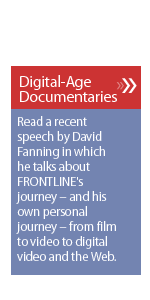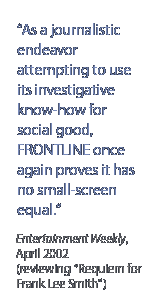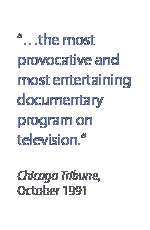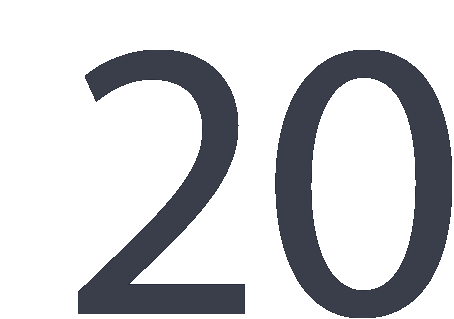|

"It all started on the back of a napkin. It was 1981, and I was having a
sandwich with Lewis Freedman, then the director of the Program Fund at the
Corporation for Public Broadcasting. I was hoping to get some support for a few
international documentaries. Suddenly he said, 'What about a documentary
series, here at home?' 'How often, how many?' I asked. 'Weekly, 26 weeks. What'll it cost?' That's when I reached for the napkin ...
"Back in Boston, I sat down with Peter McGhee, who then ran public affairs
programming at WGBH. Peter was my mentor. He'd hired me in 1977 to start a
series called WORLD, which had been an amazing opportunity to search out great
documentaries. We had called in hundreds of films from around the world and
watched them, trying to figure out their methods and their syntax. Peter also
gave me something else: a conversation -- one that still goes on -- about the
importance of ideas and the possibilities of television, and about all kinds of
other things, from clam-digging to novels to Middle Eastern politics. I had
learned from him about the serious business of being an executive producer, and
with our series editor, Louis Wiley, what it would take to defend the
journalism -- and the journalists -- against outside interests. And every so
often Peter would gently show me a film he'd found that was so unusual or
quirky it would make me rethink my ideas of what a television documentary could
be. Over the course of five years of WORLD, we had put together over 60 films for PBS. It had been an extraordinary education ...
"So when I told Peter about Lewis Freedman's challenge to expand WORLD into a
new weekly series, we both knew what was really critical: CPB was offering us
three years of support to develop the series. That would give us time to find
smart, talented people, develop relationships, and make some mistakes. It would
also be an opportunity to let the series find its identity and its voices. And
it was an important time to do that -- right at the moment we were watching the
disappearance of the documentary from network television. In fact, one of the
early reviews of the new series called it 'the last best hope for the TV
documentary' ...
"From the beginning, we wanted to make the connection between great journalism
and great filmmaking. We would try to create a place on public television where
we could publish what I called 'literate television.' And we wouldn't turn away
from controversial issues or stories others had avoided because they seemed too
complex for television. We also knew we wanted to give producers time -- time
to read, to think, to understand the context and meaning of an idea or a story.
Above all, we wanted it to be intelligent. And we wanted people to watch ...
"It was January 1983 when we launched FRONTLINE on PBS with 'An Unauthorized
History of the NFL.' The program was anchored by Jessica Savitch. We wanted to
get attention and we got it. With senior producer Mike Kirk, we would go on to
put 25 films on the air that first season. We had some successes. We
also made some mistakes. And we learned a lot. We learned about the complex
relationship between fiercely independent producers and strong editors, and we
learned something about what we wanted a 'FRONTLINE' to be. Narrative has
always been the engine that drives a FRONTLINE documentary. At the heart of the
best documentaries there is a journey of inquiry -- someone who travels out
into the world, comes back with a story, and who then finds meaning in it, and
intrigue; someone who tells you about something you never quite knew before, or
in a way you hadn't quite thought about ...
"The best documentaries are, I think, harder to make than a dramatic film.
Movies, to a large extent, stand or fall on the strength of their scripts. But
a documentary is a collection of found objects: fragments you've collected,
accidents of interview and happenstance, pieces of stock footage that surface
in the course of six to nine months of research and production. The puzzle of
making those disparate pieces fit into a dramatic structure -- one that has
acts, one that has an arc of inquiry and discovery -- is a very, very difficult
thing to do well. I always hoped that FRONTLINE could be a series that we could
show to the filmmaking and journalism communities and say, 'This is an
interesting structure; here's a different grammar ...' or 'We took on this story
and we thought this was a way to tell it ...'
"The hardest challenge has been to be fresh and surprising week in and week
out. I don't really think of FRONTLINE as a strictly public affairs series; I
think of it as a work of journalism that is constantly reinventing itself. It
has ranged widely over the years as we've looked to balance our own curiosities
with the ways in which the world is shifting its focus and attention. FRONTLINE
can move from child sexual abuse to early Christianity; from politics to the
press; from Hollywood to Washington. But the real test is whether the stories
we do matter. They matter when we take a small local story like 'An
Ordinary Crime' and right a miscarriage of justice; they matter when we mount a
massive four-part series like 'Drug Wars' and get the attention of the policy establishment; they matter when on Sept. 11 we can reach for our own
reporting and show a program about Osama bin Laden that the White House wants to watch. And we know our content matters when hundreds of thousands of
visitors come to the FRONTLINE Web site ...
"Indeed, the most exciting new development for FRONTLINE has been its passage
into the Internet age. For so long, these big and significant films we produced
had disappeared into the ether one night. For all the hard work and the many
millions of viewers who watched them, there was something ephemeral,
transitory, about the broadcast. Then, in October 1995, confronted by a wealth
of material in our investigation of the Waco siege, we decided to take the
interviews, the FBI surveillance tapes, details from the research, and arrange
them in a Web site. Mike Kirk produced the film, but it was his successor, then senior producer Mike Sullivan, who really saw that opportunity and pushed to
make it happen. As best we know, that was the first deep-content editorial Web
site in history ...
"I'm as proud of the FRONTLINE Web site as any work we've done in the last 20 years. The series editorial director, Marrie Campbell, took to it with a
passion, and really created, in parallel with the broadcast series, a work of
enormous depth and value. Today there are some 120 individual Web sites, each
its own wonderfully designed and edited publication. Also, in publishing the
full-length interviews and all the corollary research, we have made our
journalism transparent. And one day soon, we'll be able to preserve entire
films on the site as well -- so that anyone can come and find them at any time
in the future. We won't be throwing them up in the air to be lost any
more ...
"Of course that begs the question: How are we going to survive in the new age
of digital television? With time-shifting and digital video recorders, when so
much of the television landscape has become fragmented and noisy, when
audiences have become accustomed to spending less and less time on a single
story, it's going to be a challenge for FRONTLINE. Can we persuade our audience
to look for us? In an era of disposable television, can we make television that
lasts? And, can we sustain the hour-long narrative documentary?
"The answer, of course, is that we must. In the face of all the competition for
attention in today's media environment, there has to be a place that says, 'We
can take on difficult, tough subjects and do them intelligently and
thoughtfully.' If we give up on the idea of doing these films -- of sending
smart people out to pursue important ideas at some length and with some degree
of complexity -- then we give up on the idea of this medium being the best of
what it can be. We give up on the audience; we give up on the promise of
television that matters ...
"I never imagined that 20 years and some 420 films after those scribbles on
a napkin, FRONTLINE would still be here. It's a testament to the unwavering
support we have enjoyed from public broadcasting -- from the stations, and from
PBS and CPB. There's been a dedicated and energetic core staff in Boston, but
really the series is the collective work of the reporters and producers. The
series is their work. It's been a privilege to share it with the world."
| 


 |

